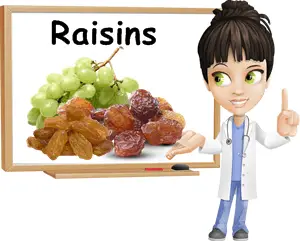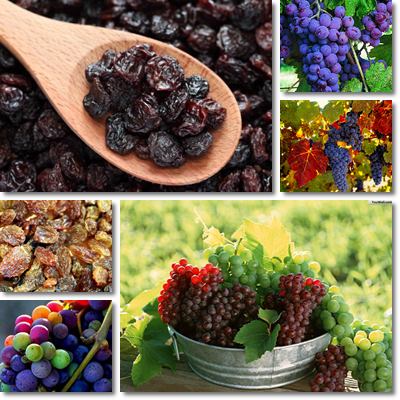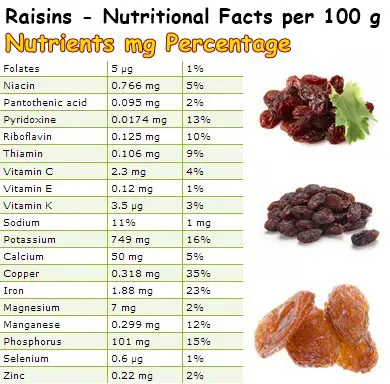Although they may not seem too appealing at first sight, raisins are actually sweet and savory, and make a wonderful alternative to traditional candy. Most dried fruits such as raisins, prunes or dried figs are actually full of nutrients and boast many impressive health benefits. Both raisins and dry plums, for instance, are an efficient natural remedy for constipation, help prevent hypoglycemia and contribute to improving energy levels. They are best eaten as such, but can be added to baked sweets or even salads for a more chewy texture and sweeter flavor.
However, the most important thing is that they are healthy, provided you chose organic brands. Raisins are often recommended as a healthier substitute for regular sugary candy. Whenever you crave something sweet, you can choose a handful of raisins to lollipops, cake or muffins. Because they contain fructose and glucose naturally, they can easily satisfy your craving for something sweet, not to mention they are a lot healthier.

Types of raisins and how they look
Depending on the variety of grapes used to make them, there are 3 main types of raisins:
- Sultanas are made from seedless varieties of dried white grapes. They produce rather plump light or dark brown raisins.
- Currants or Black Corinth are raisins made from dried, dark red, usually seedless grape varieties. They lack the sweetness of the former, but are nonetheless sweet (all cherries taste sweet to a certain extent).
- Golden raisins are also made from dried white grapes, but they are treated with a food preservative called sulfur dioxide to give them a golden tint and make them look more appealing.
What are the benefits of raisins?
These 10 health benefits might make you want to eat raisins on a more regular basis:
Improved energy levels
Raisins are loaded with simple sugars such as fructose and glucose, which the human body absorbs easily. Because they are easily assimilated, they provide almost instant energy. Moreover, the vitamins and minerals found in raisins are absorbed along with the two sugars as well, meaning raisins supply our body with both energy and nutrients.
Natural digestion aid
Basically, raisins are dried grapes, meaning all the water has been extracted from them. When they reach our intestines, the fiber present in them begins to absorb water. This favors the passage through the intestines and facilitates one’s trips to the toilet. What this basically means is that constipation can be prevented naturally by ensuring an adequate fiber intake. Oats, rye, barley, almonds, walnuts, green vegetables, raisins, blueberries, pears or flax seeds are all great sources of both soluble and insoluble fiber. Apples contain pectin, a type of dietary fiber known to help relieve constipation naturally.

Benefits for tooth decay
While regular candy causes tooth decay and jeopardizes oral health in general (when consumed on a daily basis and in large amounts), raisins are actually good for our teeth. Because they contain oleanolic acid, a powerful anti-inflammatory, raisins prevent the growth of harmful bacteria responsible for cavities and gum disease. Oleanolic acid is also known to be a powerful hepatoprotective, antiviral and anticancer agent. However, this does not mean we can fill up on raisins and stop brushing our teeth.
Promote bone health
Because they contain calcium, raisins contribute to maintaining strong, healthy bones and teeth. They also supply 15% of the recommended daily intake, RDI, of phosphorus for every 100 g, further aiding in preserving a strong bone frame.
Alkaline food
Due to their potassium content, raisins help reduce acidity in the body. Abnormal metabolic acidosis is a condition that leads to toxins accumulating in the body and may cause arthritis, gout, kidney stones and heart disease. Moreover, potassium regulates fluid levels in the body, having a direct, beneficial action on blood pressure. Because of their action, raisins are classified as alkaline foods according to the alkaline acid diet.

Anti-inflammatory and antimicrobial properties
Raisins contain polyphenolic compounds with potent anti-inflammatory and antibacterial properties which help fight off infections and support the immune response.
Antioxidant benefits
Polyphenols found in raisins boast impressive antioxidant properties with a beneficial impact on eye health in particular. Antioxidants scavenge harmful free radical molecules and prevent them from causing serious damage to cells throughout our body.
Benefits for anemia management
Raisins provide good amounts of iron (23% of RDI, recommended daily intake for an average adult) and copper (35% of RDI). Iron supports red blood cell production and prevents anemia, at the same time contributing to improved energy levels. Copper promotes blood coagulation and fast wound healing.
Anticancer properties
Catechines are potent antioxidant compounds found naturally in raisins. They are believed to offer anticancer protection by preventing the harmful action of free radical molecules. When free radical damage accumulates, it causes inflammation that can build up and lead to more extensive cell damage and potentially cancerous mutations.
Benefits for the nervous system
Last but not least, raisins support nervous system health. They are a good source of B vitamins, notably vitamins B1, B2 and B6. B vitamins support brain and nervous system health, not to mention digestive and skin health. Being rich in arginine, an amino acid also found in nuts and cereals, raisins appear to improve blood circulation.
What are the side effects of Raisins?
Raisins are generally a healthy food, preferred to processed candy and sweets because of their fiber content and vitamin and mineral content. However, no food is devoid of side effects, including raisins. Here are the potential side effects associated with consumption of raisins:
Can cause allergic reactions
If you are allergic to raisins, you are either allergic to the grapes themselves or to the preservatives used to improve color and shelf life (e.g. sulfur dioxide or other sulfites). Avoidance is the only real solution for allergic reactions. In case an allergic reaction installs and you experience symptoms such as a skin rash, itching, swelling of the face or throat, closing of the airways, wheezing, difficulty breathing, digestive upset, low blood pressure, dizziness or fainting, seek medical help immediately before anaphylaxis installs.
Can cause headaches and migraines
Headaches and migraines caused by eating raisins can be a symptom of an allergic reaction, in which case other symptoms are likely to follow, or a sign of an intolerance to components in the dried fruit, most likely preservatives such as sulfur dioxide or other sulfites.
Raisins intolerance symptoms
It is possible to experience intolerance to raisins. Symptoms may include headaches, migraines, but also digestive upset of the likes of nausea, vomiting sensation, bloating, gas, loose stools and diarrhea. Food intolerance may also manifest through symptoms such as a skin rash, swelling of the face, mouth ulcers, runny nose or nasal congestion, sneezing, asthma attacks and other symptoms normally attributable to allergic reactions. Although a food intolerance is not an allergic reaction, it can progress to one and build up to anaphylactic shock.
Conclusion
As with all things, moderation is the key. So whenever you crave something sweet, you can enjoy some raisins. Not only are they flavorful, but they also provide a wide range of health benefits, supporting digestive, bone, cardiovascular, skin and nervous system health. Overall, they hold a good nutritional value and provide important amounts of almost all essential vitamins and minerals.
